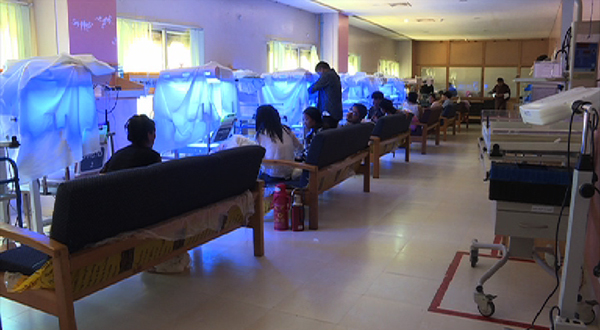 The health ministry says lack of infection control measures have caused the bacterial infection outbreak at the Jigme Dorji Wangchuck National Referral Hospital (JDWNRH) in Thimphu that led to the death of 11 babies recently.
The health ministry says lack of infection control measures have caused the bacterial infection outbreak at the Jigme Dorji Wangchuck National Referral Hospital (JDWNRH) in Thimphu that led to the death of 11 babies recently.
The newborn babies in the Neonatal Intensive Care Unit (NICU) of the hospital, all died after being infected with Klebsiella pneumonia.
Klebsiella pneumonia is a bacterium that lives inside human intestines. It causes a range of diseases and is spread through direct person-to-person contact.
A parent said his son was born premature and weighed only 1.79 kilograms and he died 15 days old.
“My son was born by cesarean, he was then admitted in NICU. If there was an infection inside the hospital, I could have taken my son and wife home. The death of 11 babies is a great loss and I pray such an incident does not happen again.”
The hospital management says while the hospital is yet to find out how the infection spread in the unit. But they found the water supply to the hospital was contaminated. Babies, especially those born prematurely are more vulnerable to infection as their immune systems would not have developed properly.
Normally, for the preterm babies, milk is expressed in a cup and syringe and a plastic feeding tube used to feed the babies. However, the hospital’s management explained it is not possible to provide a new cup every day and parents are expected to wash it.
The management added even if they have washed the utensils properly, because of the contaminated water, there could be the risk of babies getting the infection.
The infection was first noticed on July 16 and health ministry was informed on August 1. The last case was reported on August 9.
An investigation team from the ministry found that besides water contamination, failure to institute infection control measures has led to the outbreak of the infection.
“There seems to be limited supporting staff, who clean the hospital. Also, because of a shortage in nursing staff, parents themselves were feeding the infants with the tube which resulted in unhygienic means,” Dr Ugen Dophu, the Health Secretary, said.
“The NICU, ICU, dialysis are high-risk areas that need to be under surveillance and monitored every month. However, it has not been carried out properly.”
The secretary also added that insufficient supply of hand sanitizers and soaps, and the disposable tubes inserted into children were cleaned and reused.
“In future, the supply of hand washing soap, hand sanitizers, towels and bleaching powders should always be made available. Also, for cleaning the hospital, bleaching powder needs to be used in a proper concentration.”
He added the investigation team also noticed that ICU, NICU were always crowded with patient visitors thus increasing the risk of various infections.
Meanwhile, the JDWNRH will establish a dedicated infection control and waste management division to prevent such infections.
The patient visitors at the NICU will be restricted and the water tank will be kept locked to prevent from contamination.












